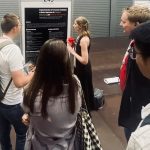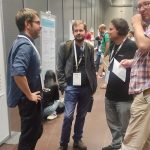
Employees of the Department of Information Systems took part in ACL 2025 (the 63rd Annual Meeting of the Association for Computational Linguistics), a top-tier conference on artificial intelligence, held in Vienna in the last week of July 2025. Researchers presented results published in the ACL Anthology, prepared as part of a shared task on the detection and classification of persuasion techniques in Slavic languages.
 The first publication – “Robust Detection of Persuasion Techniques in Slavic Languages via Multitask Debiasing and Walking Embeddings” by Ewelina Księżniak, Krzysztof Węcel, and Marcin Sawiński – describes a solution to the binary classification problem using multilingual language models along with original strategies aimed at improving classification accuracy. Walking Embeddings enable the analysis of changes in text representation vectors, while Content-Debiasing is based on supervised contrastive learning using pairs of semantically equivalent but stylistically diverse texts. These methods achieved first place for Croatian and Bulgarian, second place for Slovenian, third place for Polish, and fourth place for Russian.
The first publication – “Robust Detection of Persuasion Techniques in Slavic Languages via Multitask Debiasing and Walking Embeddings” by Ewelina Księżniak, Krzysztof Węcel, and Marcin Sawiński – describes a solution to the binary classification problem using multilingual language models along with original strategies aimed at improving classification accuracy. Walking Embeddings enable the analysis of changes in text representation vectors, while Content-Debiasing is based on supervised contrastive learning using pairs of semantically equivalent but stylistically diverse texts. These methods achieved first place for Croatian and Bulgarian, second place for Slovenian, third place for Polish, and fourth place for Russian.
 The second publication – “Multilabel Classification of Persuasion Techniques with Self-improving LLM Agent: SlavicNLP 2025 Shared Task” by Marcin Sawiński, Krzysztof Węcel, and Ewelina Księżniak – presents a system developed for multilabel classification of 25 persuasion techniques in Slavic languages. The research focused on the effectiveness of in-context learning and automatic prompt optimization, as well as supervised fine-tuning using self-generated annotations. The system achieved the best macro F1 score for Croatian, the second-best for Bulgarian, Polish, and Slovenian, and the third-best for Russian.
The second publication – “Multilabel Classification of Persuasion Techniques with Self-improving LLM Agent: SlavicNLP 2025 Shared Task” by Marcin Sawiński, Krzysztof Węcel, and Ewelina Księżniak – presents a system developed for multilabel classification of 25 persuasion techniques in Slavic languages. The research focused on the effectiveness of in-context learning and automatic prompt optimization, as well as supervised fine-tuning using self-generated annotations. The system achieved the best macro F1 score for Croatian, the second-best for Bulgarian, Polish, and Slovenian, and the third-best for Russian.
 Both publications represent a significant contribution to the development of modern methods for natural language analysis, with particular emphasis on the detection of persuasion techniques in Slavic languages. The results may contribute to the creation of tools supporting the detection of manipulation and enhance the understanding of public discourse in Central and Eastern Europe.
Both publications represent a significant contribution to the development of modern methods for natural language analysis, with particular emphasis on the detection of persuasion techniques in Slavic languages. The results may contribute to the creation of tools supporting the detection of manipulation and enhance the understanding of public discourse in Central and Eastern Europe.